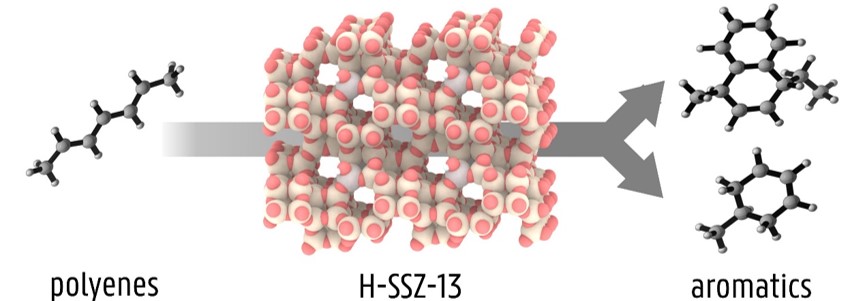Molecular level reaction engineering to improve selectivity and reduce deactivation in the methanol-to-olefins process
Molecular level reaction engineering to improve selectivity and reduce deactivation in the methanol-to-olefins process
Promotor(en): V. Van Speybroeck /20NANO02 / Nanoporous materialsProbleemstelling:
Ethene and propene are the most important platform chemicals in industry which are typically produced via steam cracking. However, the decline in fossil fuel reserves and the strive for sustainable technologies promote the usage of alternative feedstocks. In this context, methanol-to-olefins (MTO) conversion is a promising technology which is at present being rolled out on industrial scale. Methanol is contacted with an acid zeolite catalyst that triggers the production of olefins and heavier hydrocarbons. A major issue for the widespread use of this technology is catalyst stability. Fast formation of carbon deposits during operation leads to frequent oxidative regeneration treatments which significantly limits process efficiency. Ideally, molecularly engineered catalysts can be developed which are both resistant towards coke formation but also enable to steer the olefin selectivity. Various strategies have been developed to achieve this goal such as co-feeding water, optimizing the process parameters or adjusting material properties like crystallite size and acid site density. [1-2] While some approaches were successful, fundamental understanding of the governing mechanisms leading to aromatics or deactivating species remains limited. Nevertheless, such insight is necessary to make further progress in the methanol-to-olefins field.

Figure 1. Schematic representation of the transformation of polyenes into aromatics on a H-SSZ-13 zeolite catalyst.
Recently, experimental evidence was given for the role of formaldehyde in the formation of polyenes as precursors in the deactivation process. Formaldehyde is a very reactive species and its potential role in the formation of many MTO products has for a long time been overlooked. Furthermore, formaldehyde may facilitate the production of oxygen containing species which can enhance the olefin producing cycles. [3-4] On the other hand, co-feeding H2 at high pressures substantially improved the catalyst lifetime. [1] The influence of formaldehyde can be controlled by stimulating or reducing hydrogen transfer reactions. While it is known that oxygenate species can be present under MTO conditions, their precise influence on the formation of polyenes and deactivation routes is not fully understood.
Doelstelling:
The goal of this master thesis is to investigate the role of formaldehyde on the formation of active and deactivating species in the methanol-to-olefins process. Both the ZSM-5 and SSZ-13 zeolites will be considered since these are the two main MTO catalysts used in industry. Due to the large difference in the pore network of both zeolites, the reactivity of the MTO intermediates might be very different. First, a competitive adsorption study of methanol, formaldehyde and olefins at the acid sites of the zeolite catalyst will be conducted as these species have a different reactivity for subsequent reactions. Then, you will compare the reactivity of several competing pathways like the classical alkene methylation route towards light olefins and the methylation route with formaldehyde which leads to the formation of alcohols, which can further be dehydrogenated to light olefins. Finally, you will look into the effect of formaldehyde on deactivation pathways like the formation of polyenes as coke precursors. The obtained results will be compared with available experimental data.
The Center for Molecular modeling has a proven track record in performing advanced molecular simulations. The student will be actively coached by experienced researchers to get acquainted with all techniques that are required to tackle the problem at hand. This research topic is very challenging and will be conducted in collaboration with experimental partners to ensure the validity of the obtained results.
- Study programmeMaster of Science in Chemical Engineering [EMCHEM]KeywordsHeterogeneous Catalysis, Zeolites, Methanol-to-olefins, AromaticsReferences
[1] S.S. Arora et al., Nature Catalysis 1 (2018) 666-672
[2] I. Yarulina et al., Nature Chemistry 10 (2018) 804-812.
[3] S.S. Arora and A. Bhan, J. Cat. 356 (2017) 300-306.
[4] S. Müller et al., J. Am. Chem. Soc. 138 (2016) 15994-16003
